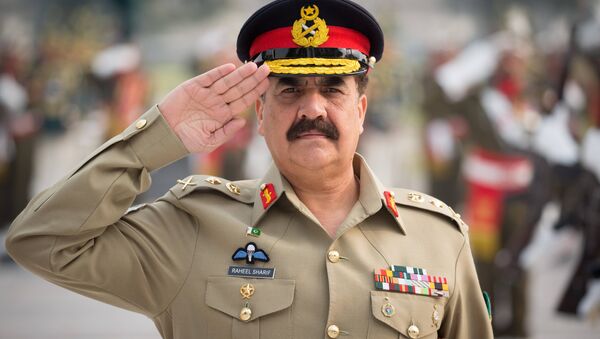The Saudi-led Islamic Military Alliance to Fight Terrorism (IMAFT), dubbed the Muslim NATO, will be made up of 39 Sunni Muslim states under the command of Raheel Sharif, Pakistan's retired army chief.
According to media reports, the announcement that Raheel Sharif would lead the so-called new Muslim NATO came from Pakistani defense minister Khawaja Asif, who revealed the appointment on television.
The IMAFT was created in 2015 to fight Daesh (also known as Islamic State) terrorists, but is not supported by Iran. And it's also unlikely that other "major Islamic" countries in the region will "support its activities," Dr. Amalendu Misra, politics expert at University of Lancaster told Sputnik.
What does Islamic State actually want? Lancaster's Dr Amalendu Misra writes for @ConversationUK: https://t.co/RC7GuMVxGT
— Lancaster University (@LancasterUni) November 19, 2015
"I think it's unlikely, that this particular force is going to make any dent in violence in any major Islamic country," Dr. Misra told Sputnik.
General (retd) #RaheelSharif three conditions for taking up the new job.#IMAFT pic.twitter.com/y6du7swVmB
— Kiran Raza (@kiranraza_01) January 9, 2017
"All the Islamic countries are fiercely protective of their sovereignty. Are they really going to allow them [IMAFT] to undermine their sovereignty and intervene in their country, how credible is that going to be?" Dr Misra asks.
Dr. Misra also doesn't think it's likely that IMAFT will be allowed in by Egypt or Afghanistan either.
"When it comes to big powers in the region, like Afghanistan, they're not going to allow more military intervention after having seen a quarter of a century of military intervention from other forces."
The recent announcement that Pakistan's former army chief is to command IMAFT has led to criticism on social media.
Instead of becoming puppet of Saudis #RaheelSharif should rethink on his decision of joining so called alliance#راحیل_بنو_ریال_شریف_نہیں
— Syed Zaki A. Shah (@SZakiAbbasShah) January 10, 2017
Some Shia political groups have expressed concern meanwhile Sunni groups have come out in support of Sharif.
Another great achivement for Gen. Raheel Sharif, you were pillar of strength for Pakistan and now also for entire Islamic world. pic.twitter.com/cObvTcdVqa
— Shahid Afridi (@SAfridiOfficial) January 7, 2017
Meanwhile Dr. Misra remains cautious, as he told Sputnik:
"I would wait and see as to how far they are going to succeed in terms of brokering peace and in undermining the terrorist outfits."




